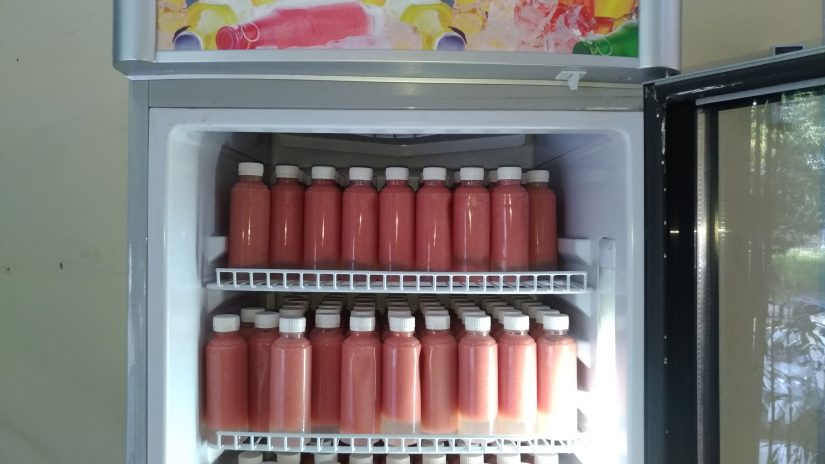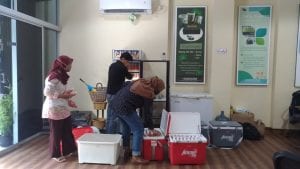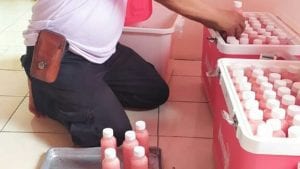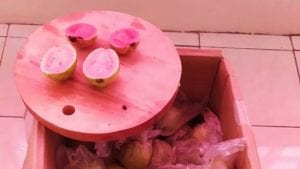
Many ways had been done by UGM in order to handle this pandemy. Recently, the UGM unit’s collaboration is getting intensified as an act for caring. Mainly for those who work on the front line or the civilians who are exposed to this impact.
The collaboration of Directorate of Civil Service (DPkM) and Center of Agrotechnology Innovation (PIAT) is one of them. It is not the first to be introduced. The prior collaboration of the two was on the 2019’s First Period of Student Study Service (KKN). The collaboration’s goal is to distribute seeds for the agro cluster student. This time, the goal is to provide the source of nutritions and vitamins to strengthen the immune system.
The Disaster Response Unit team (DERU) , which is managed by DPkM directly, runs plenty of activities in addition to handle the Covid-19 national disaster. “One of the developments is the activity that positively impacts the civil’s economy, as one of the sectors which is starting and going to be exposed severely. For example, the traditional market’s fruit merchant whose omzet would be drastically declined”, said the secretary of DPkM UGM, Dr. Rachmawan Budiarto, S. T., M. T.
DERU tries to create a program which produces plentiful impact in several directions: the juice production that collaborates with traditional market merchants or the locals. The money from this activity could increase the omzet of the merchant and become the income of the local’s who own fruits. This business is run by the locals and workers to ensure the wheel of the economy.
Meanwhile, the juices will be packed to ease the distribution to various targets, such as the PIAT officers, the DERU volunteers, the active KKN students who are associated with DERU’s program, DPkM staff, and other communities such as the farmers near the production unit. The first step of this program is to increase the production capacity by getting the equipment and ingredients to open a new unit in Mangunan.
For the initial batch, PIAT, which is the producer, would take 20kg of fruits per day. From those amounts of fruit, it could be produced up to 150 bottles that would be delivered to DPkM each day. “The juices production depends on the availability of the fruits which come from the PIAT’s partner. The production is made at the branch office of PIAT in Mangunan which collaborates with the staff there”, said Triya Andriyani, S. P., M. Sc., the Public Relations of PIAT UGM.
 |
 |
 |
 |
The first distribution on Monday (13/04), PIAT offers red guava juice which is believed to prevent various diseases because of increasing metabolism. The red guava has plenty of benefits for our health. It also contains a lot of nutrition. For 100g of guava, there are 0.9g protein, 0.3g fat, 12.2g carbohydrates, 14g calcium; 28mg phosphors; 1.1mg iron; 25 SI vitamin A; 0.02mg vitamin B1; 87mg vitamin C; 5.6g fiber; 86g waters; and 48g calories. “The vitamin C contents in guava’s flesh is considered to be the highest among the other tropical fruit. The flesh also contains a lot of carotenoids antioxidant and polyphenol, making guava is believed to have plenty of health impact,” as elaborated by Ir. Taryono, PIAT’s head.
It is programmed to be continued up until the Covid-19’s emergency response period over. It is also hoped to maintain the volunteer’s stamina. The first step of this program would be evaluated and monitored periodically. If it is successful, there would be increased capacity for the absorption and the procession of the fruit.
This program is chosen with the consideration of its continuity. It is hoped that this program would be developed with the collaboration of locals after this national disaster. This would be a part of UGM’s business to heighten the value of the local’s business/resources. It is possible for the juice production unit would be developed to become a bigger business which gives the prosperity to its surrounding.
